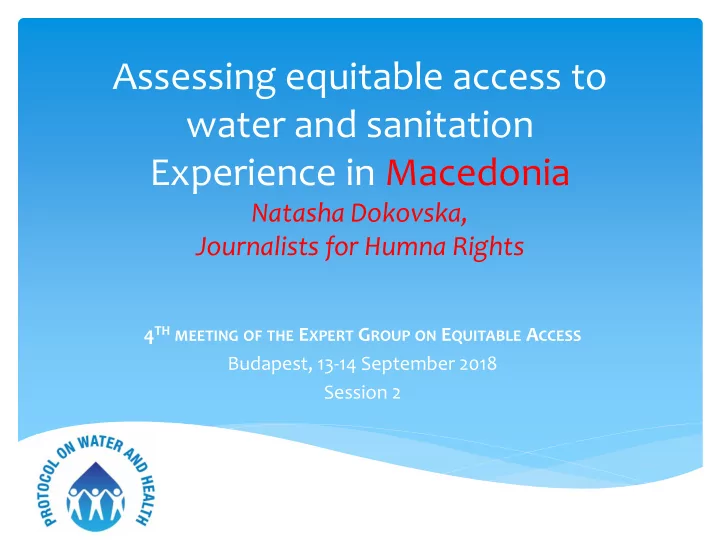

Assessing equitable access to water and sanitation Experience in Macedonia Natasha Dokovska, Journalists for Humna Rights 4 TH MEETING OF THE E XPERT G ROUP ON E QUITABLE A CCESS Budapest, 13-14 September 2018 Session 2
Background and objectives of the equitable access assessment Journalist for Human Rights in cooperation with the Institute of Public Health in Macedonia and support of UNECE secretariat Protocol for Water and Health conducted the Score card for equity access to water in sanitation in 2015/2016. - In 3 communities - With multi stockholders approach - Involvement of more than half of population in Macedonia - Multiethnic
Process: Applying the Equitable Access Score-card Lead organization(s): Journalists for Human Righst and Institute of Public Health Support by: UNECE Partners: Relevant Ministries ( environment, health, agriculture, forest and water management, self – governance, finance, social affaires, public institutions and water utilities companies, local communities, local NGOs and media Scale of the project: Central Macedonia was included with the municipalities of Skopje, Veles and Kumanovo with 4 municipalities
Process: Applying the Equitable Access Score-card Timeline : Implementation of the Project was dévide on 2 phases and last one year: 1 phase: self - assesement 2 phase: results Activity: • Translation and printing the score card • Established the working group in all targeted communities • Organized one day and half introduction workshop • Work on field – collect the results • Conference where we present he main finding • Printing the results – disribute the results trough media, final conference meetings with main stakeholders
Outcomes of the assessment: main findings Situation of equitable access to water and sanitation Situation of equitable access to water and sanitation In every hospital ward there are separate toilets for men and women In every hospital ward there are separate toilets for men and women and bathrooms for personal hygiene , while other health facilities have and bathrooms for personal hygiene , while other health facilities have toilets for men and women toilets for men and women not suitable for maintaining menstrual hygiene not suitable for maintaining menstrual hygiene
Outcomes of the assessment: main findings Situation of equitable access to water and sanitation All educational institutions in the city have access to safe water and sanitation . All educational institutions in the city and countryside have special toilets for men and women as well as in larger schools in the villages, and in some of the smaller satellite schools have common toilets. But , none of the educational institutions have adequate facilities to maintain menstrual hygiene.
Outcomes of the assessment: main findings Situation of equitable access to water and sanitation Skopje has a highest percentage of proper and equitable access to water and sanitation But, in same time In Skopje, municipality of Shuto Orizari has the highest percentage of families living in housing without water and sanitation. The most affected are the women and girl. Only 16 per cent of Roma living in Skopje have a toilet and a bathroom , The rest use toilets outside of their homes . Just 26 per cents have access to water
Outcomes of the assessment: lessons learnt from the process Process In general in Macedonia their citizens approx . 90 % have access to water and sanitation In targeted municipalities not public toilets Geographical disparity Lack of finance in the municipalities to develop and maintains the access to water and sanitation Missing WWWTP ( except in municipality Kumanovo) Lack of MHM in schools (except in one private school in Veles) Lack of access to drinking water and sanitation for homeless Bacteriologically improper drinking water in rural areas (20-40%) No access to drinking water and sanitation in religious facilities
Communication of the findings • After assessment and results we have: - Conference with all involved stakeholder in the process of assessment and discuss with them finding - Printing and distribute the results - Press conference to present the result to media and international community in Macedonia - Meetings with representatives of local communities
Planned next steps The results of the assessment were not considered as criticisms to the local government, but as an incentive to improve detected weaknesses and to promote access to water and sanitation, especially in public institutions and schools ... After accepting them by mayors, we started preparing LAP ... In cooperation with the representatives of the municipalities and several coordinative meetings, the LAPs were made and we are waiting for the initial adoption by the municipal councils and their implementation ... Just as for the illustration in the municipality of Veles , immediately after the presentation of the results, the mayor undertakes the reconstruction of the toilets in two primary schools ...
Recommend
More recommend